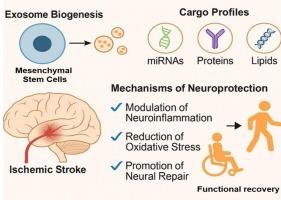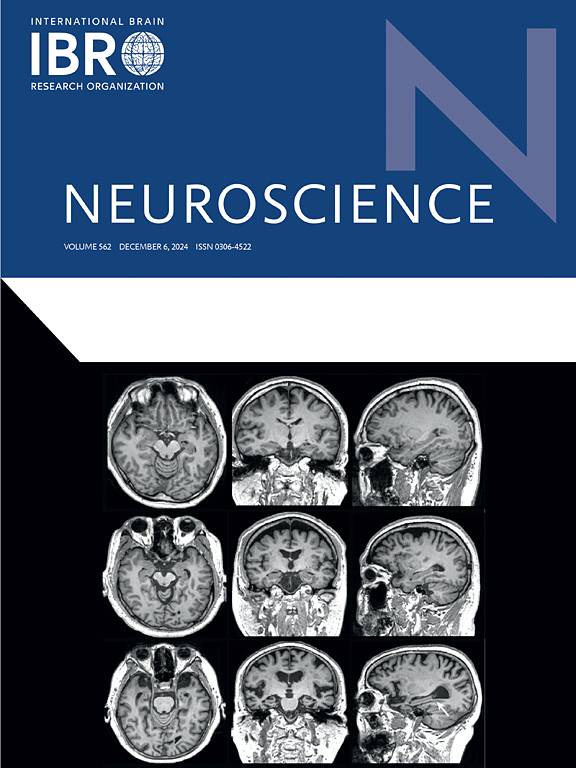A narrative review on exosomes therapeutics in stroke: advancing neuroprotection and regeneration
IF 2.8
3区 医学
Q2 NEUROSCIENCES
引用次数: 0
Abstract
The complexities of neuroinflammatory processes and the limited regenerative capacity of neural tissues have made ischemic stroke one of the leading causes of disability in many countries for the long periods after the initial incidence. Extracellular vesicles (EVs), more particularly exosomes, are emerging as promising agents for therapeutic usage, because of their outstanding ability to alter immune response and minimize oxidative stress suffered by neural tissue, and to enhance neuronal repair. The narrative review covers exosome biogenesis, particular cargo components, and mechanistic properties of exosomes in stroke therapy. It evaluates neuroprotection along with neurogenesis in both preclinical and clinical models, amassing their findings in immune modulation. Exosomes mediate neuroprotection through cargo-driven mechanisms involving miRNAs (e.g., miR-124, miR-21), stress-responsive proteins (e.g., HSP70), and bioactive lipids, facilitating neural repair post-ischemia. This review provides an in-depth analysis of exosome biogenesis, their cargo profiles, and the translational potential of exosome-based therapies in ischemic stroke. It discusses some of the advantages of exosome therapies over traditional cell-based therapies, such as greater safety profiles and more prolonged storage stability, based on the latest literature. Notwithstanding the challenges presented by exosome isolation and targeted delivery, their therapeutic possible applications deserve increasing attention. However, current translational efforts focus on optimizing exosome sourcing, improving targeting accuracy, and ensuring safety, positioning this innovative approach as a compelling candidate for next-generation stroke interventions with the potential to improve outcomes and facilitate personalized medicine.

外泌体治疗脑卒中的综述:促进神经保护和再生
神经炎症过程的复杂性和神经组织有限的再生能力使缺血性中风在发病后的很长一段时间内成为许多国家致残的主要原因之一。细胞外囊泡(EVs),尤其是外泌体,由于其改变免疫反应和减少神经组织氧化应激以及增强神经元修复的卓越能力,正在成为治疗用途的有希望的药物。叙述综述涵盖了外泌体的生物发生,特殊的货物成分,以及外泌体在中风治疗中的机械特性。它在临床前和临床模型中评估了神经保护和神经发生,积累了他们在免疫调节方面的发现。外泌体通过涉及mirna(如miR-124、miR-21)、应激反应蛋白(如HSP70)和生物活性脂质的货物驱动机制介导神经保护,促进缺血后的神经修复。这篇综述深入分析了外泌体的生物发生,它们的货物概况,以及基于外泌体的治疗在缺血性卒中中的转化潜力。根据最新文献,讨论了外泌体疗法相对于传统细胞疗法的一些优势,如更大的安全性和更长的储存稳定性。尽管外泌体分离和靶向递送带来了挑战,但它们的治疗应用值得越来越多的关注。然而,目前的转化工作集中在优化外泌体来源,提高靶向准确性和确保安全性,将这种创新方法定位为下一代卒中干预的令人信服的候选方法,具有改善结果和促进个性化医疗的潜力。
本文章由计算机程序翻译,如有差异,请以英文原文为准。
求助全文
约1分钟内获得全文
求助全文
来源期刊

Neuroscience
医学-神经科学
CiteScore
6.20
自引率
0.00%
发文量
394
审稿时长
52 days
期刊介绍:
Neuroscience publishes papers describing the results of original research on any aspect of the scientific study of the nervous system. Any paper, however short, will be considered for publication provided that it reports significant, new and carefully confirmed findings with full experimental details.
 求助内容:
求助内容: 应助结果提醒方式:
应助结果提醒方式:


